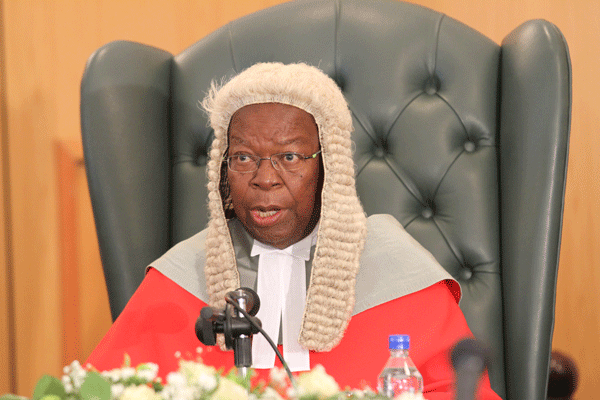
So many things are left unsaid and before we know it, we can never say them to the person again. Wafa wanaka is usually used as a blanket term in describing our treatment of the dead.
the Bornwell Chakaodza column By Natasha Kasukuwere

The story I have to tell is one of a principled man, unapologetically patriotic, a judge par excellence and champion of black empowerment and land reform. The story I must tell you does not start off with his date of birth and village of origin but it begins with his most striking statement.
“I took over these reins during a turbulent time which saw people of Zimbabwe taking back their land. This split the judges bench into two with one part saying the land reform programme was illegal while another school of thought did not see it that way.
“However, If I could get the same opportunity to make the ruling again, I would stand by that because I do not regret making the decision.” The above statement is what he said when he was asked on his decision pertaining to land reform. On March 29 I walked through the halls of the Avenues Hospital. Sekuru Godfrey Chidyausiku was not well and I was going to see him.
He looked well, he even said he was feeling better, he was out of the woods. He took time to ask me how I was doing in school and which courses I was taking. I told him that his judgements had always been a matter of debate, particularly in my property law class.
I asked him what drove him to make the much-debated decision on land reform and the late, learned former chief justice had this to say:
“When I was deciding the issue on land reform, I took into account a number of factors. However, the most important thing was to look at who owned the land before the date appearing on the title deeds belonging to the white farmers.”
- Chamisa under fire over US$120K donation
- Mavhunga puts DeMbare into Chibuku quarterfinals
- Pension funds bet on Cabora Bassa oilfields
- Councils defy govt fire tender directive
Keep Reading
When he uttered this statement as he lay on an Avenues Hospital bed, it hit me, the piece of paper no longer mattered. A description of the land and the date from which ownership was acquired ceased to be relevant.
His main point, and this will stick with me forever, was, “before the title deed was drawn up, who owned the land?” A question that many have not asked themselves, maybe out of fear that the answer will be contrary to their views.
It is unfortunate that only three people heard this argument at the time, in hindsight. I wish I had moved with a recorder so as to capture these important words, however, I also didn’t think he would leave us so soon.
It had been a desire of mine to invite him to give a talk to the law students at the University of Zimbabwe, seeing as if he can no longer say anything to us I thought to bring to light the rationale behind the Commercial Farmer’s Union versus Minister of Lands case that has been critiqued and said to be wrongly decided.
However, whether or not it was wrongly decided is subject to the opinion of the individual forwarding the argument. Though seen as a largely political decision, his words to me show that it wasn’t politics, it was black empowerment, it was taking back what had been forcibly taken from us.
He made it clear that a piece of paper could not override the ills brought upon us by the white man during the pre-independence era. If we cannot go to Britain and claim that a piece of paper gives us ownership of a piece of land, they too cannot come here and express similar sentiments.
In 2014, the chief justice, sekuru, as he was known to me, visited our house a few months before I begun law school at the local university. Both sekuru and my father felt I needed some international exposure and they questioned my decision to stay in Zimbabwe when my peers were going to be educated across the globe.
Sekuru said, “Why not Rhodes? UCT [University of Cape Town] ? I said, “Why not here?” He then said “but the facilities” and I responded “you’re the ones in charge, fix them.” He never questioned my decision thereafter, he just quietly supported me.
I could go on and on about how much of a unifier he was and how calm and soft-spoken he was but everyone is saying that.
I just wanted to tell you about my final encounter with him, one of the most enlightening moments of my life.











